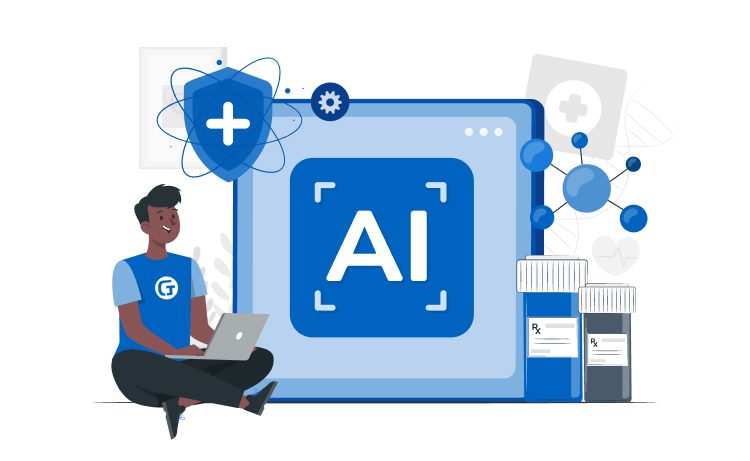
5 Game-Changing AI Uses in Healthcare



AI adoption is not just a trend but a reality for the healthcare sector. Its capabilities are being recognized and leveraged across the board, making it an essential component for innovation and growth in healthcare startups.
According to Grandview research, using AI in the healthcare market is expected to reach $187.95 billion by 2030. And the use of AI in healthcare is growing at a rate (CAGR) of 37% annually.
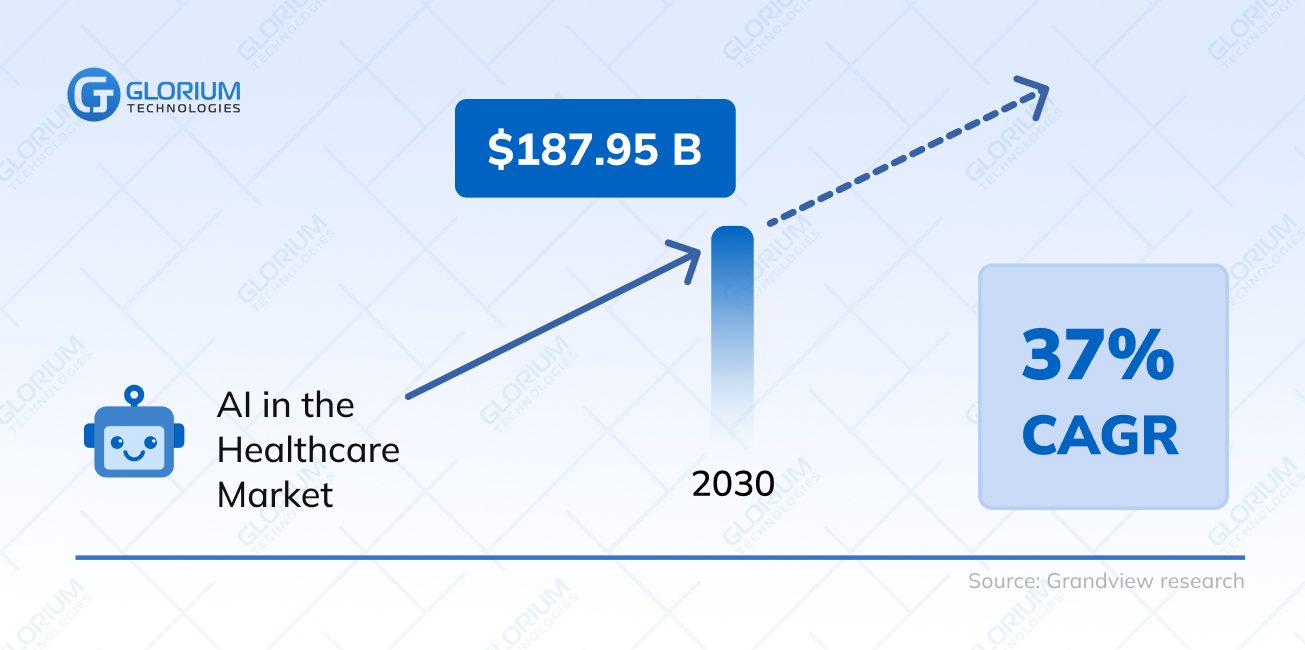
In this article, we’ll explore the top 5 cases for adopting AI in healthcare startups, supported by real-world examples that demonstrate the power of this disruptive technology.
Content
AI allows startups to achieve more with less. By leveraging machine learning models trained in biochemistry and pharmacology, startups can significantly cut down the time required for initial screenings and pre-clinical trials. This approach expedites the go-to-market strategy and translates into substantial cost savings.
Learn more about AI development services.
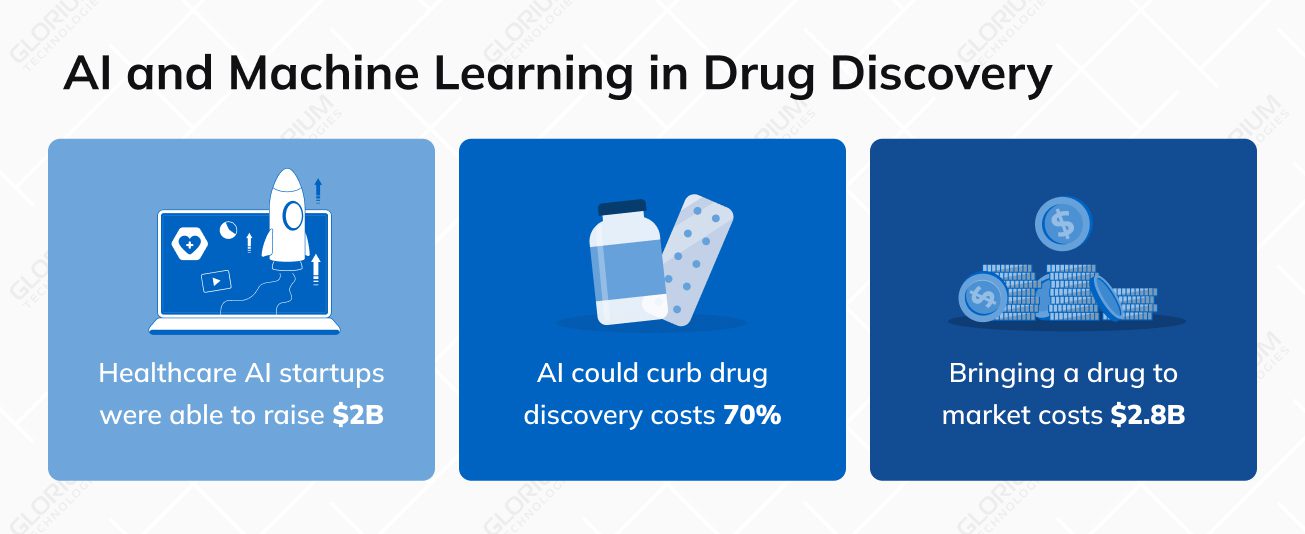
The financial implications are particularly noteworthy for startups, where resource allocation is often constrained and the pressure to innovate quickly is immense. AI enables startups to be nimble, fail quickly, and learn quickly, accelerating the iterative drug development process.
Atomwise is pioneering the use of AI in drug discovery, providing a fast-track solution to identifying potential drug candidates for diseases ranging from cancer to malaria. In 2022 a global pharmaceutical company Sanofi and Atomvise signed an AI drug discovery deal with vast numbers of $1.2 billion.
Automating AI diagnostics can speed up the identification of diseases and conditions, allowing healthcare providers to offer timely interventions. According to Grand view research the size of using AI in the diagnostic market will only grow.
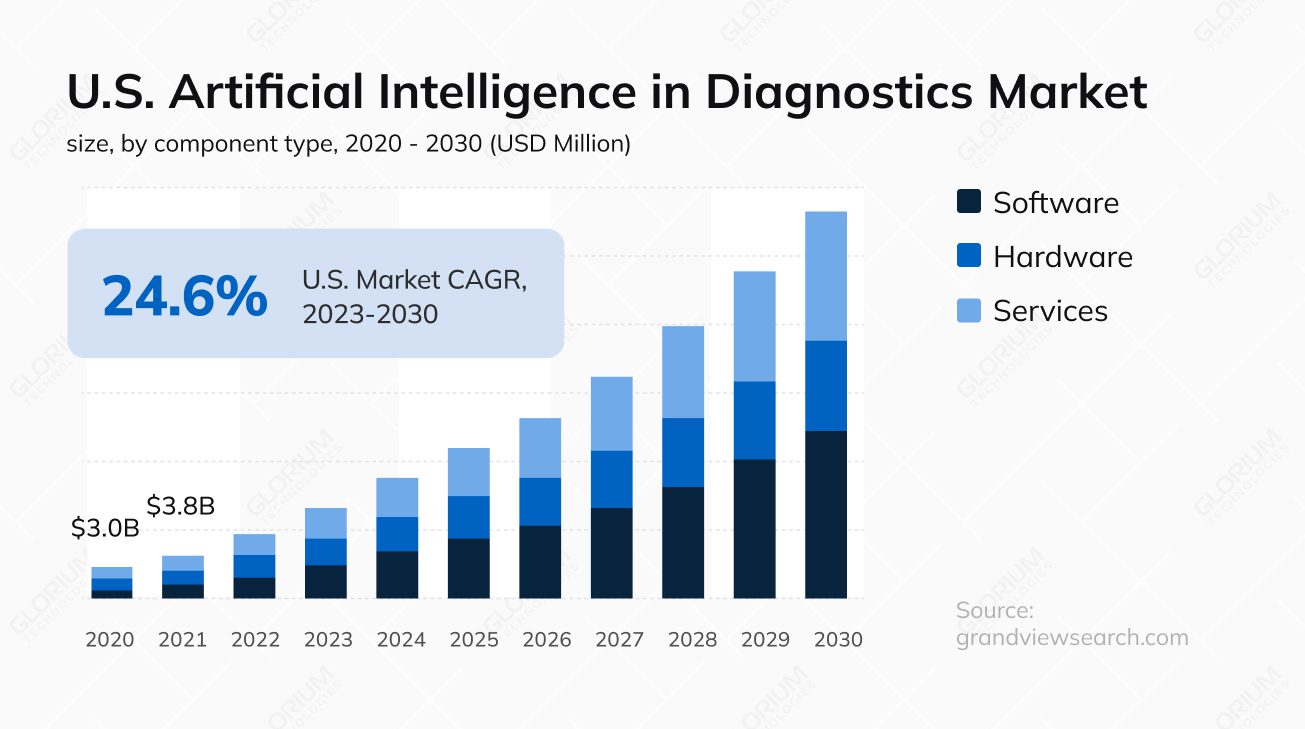
Machine learning models trained on thousands of X-rays, MRIs, and CT scans can identify patterns and anomalies far more quickly than human experts. Here is the case study from the Glorium portfolio.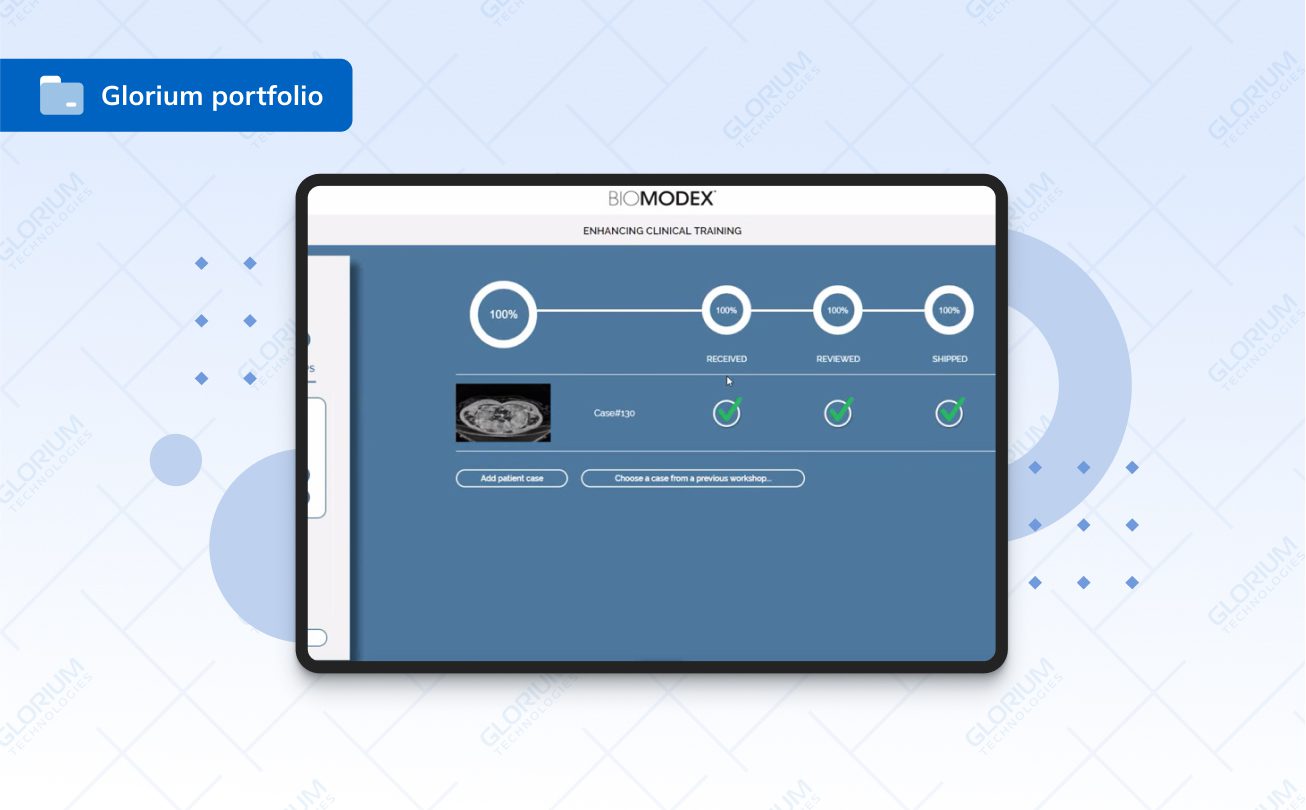
Startups like Aidoc offer AI-powered solutions that analyze medical images and flag anomalies for further review by healthcare professionals. Such solutions can significantly reduce workload and speed up diagnosis time, enabling medical professionals to focus more on patient care. Aidoc has recently unveiled a partnership with Northwell Health to implement a comprehensive clinical AI approach across Northwell’s 17 hospitals in New York state.
Ultronics’ EchoGo platform can analyze thousands of data points from echocardiogram images, while Zebra Medical Vision’s Profound software can detect various conditions like breast cancer, fatty liver, aneurysms, and emphysema. Meanwhile, the AI2 Incubator and Fujifilm SonoSite are using deep learning models to upgrade the quality of ultrasound images, making them more accessible and affordable for patients.
AI uses historical data and machine learning algorithms to predict patient outcomes. Whether it’s anticipating readmission risks, the likely progression of a disease, or potential complications, predictive analytics can guide clinicians in providing targeted care.
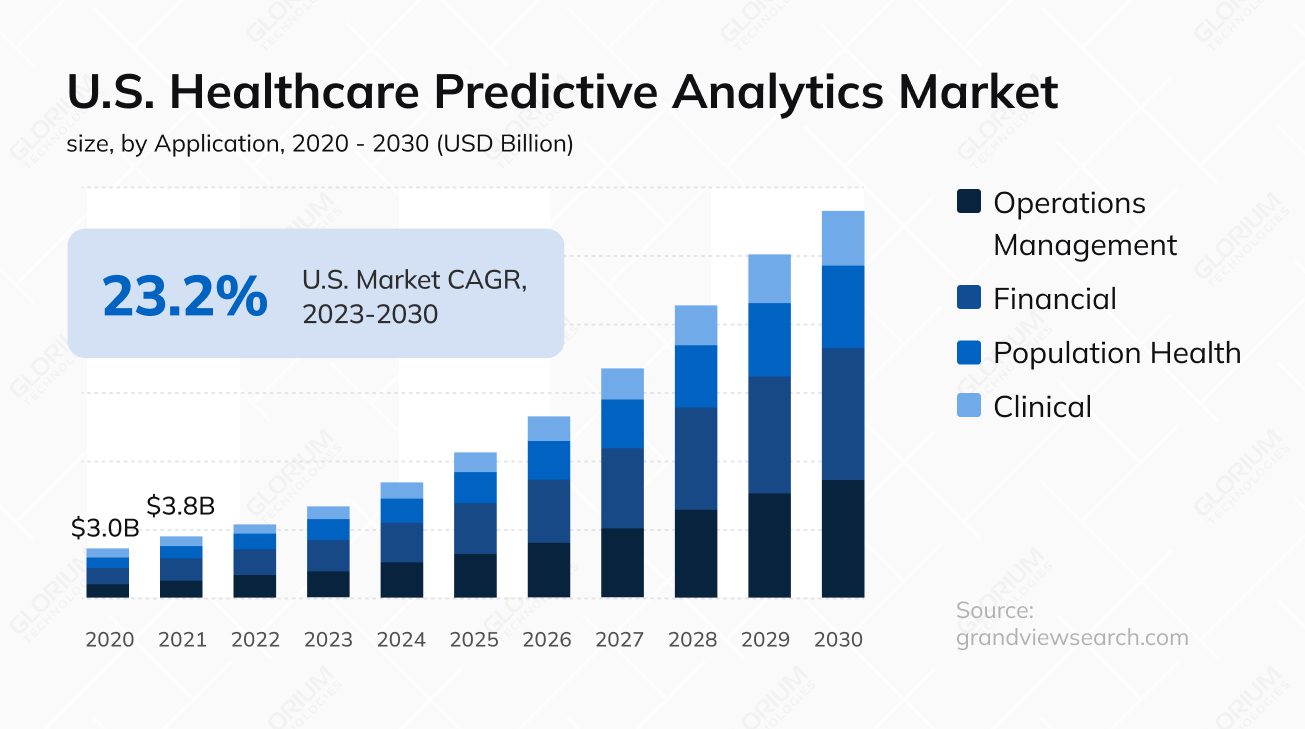
To create a comprehensive context, machine learning algorithms analyze past patient records, lab results, medication histories, and even lifestyle data. The AI system gains a nuanced understanding of probable future scenarios by examining historical data points, such as similar patient demographics, disease histories, and treatment outcomes.
Advanced machine learning algorithms process this voluminous and complex data to identify patterns and correlations that may be invisible to human observers. These algorithms are often trained using a technique known as “supervised learning,” where they are provided with both the input data and the output it should aim for, allowing them to “learn” from errors and refine their predictions over time.
To predict readmission risks, Somatus uses AI to analyze patient history, medication, and social determinants. Somatus serves as an exemplary case of how AI and predictive analytics can be ingeniously deployed to bring about meaningful changes in healthcare. AI brought cost reduction opportunities.
By analyzing patterns in treatments, patient responses, and healthcare utilization, the platform provides actionable insights to manage resources more effectively. AI technology provides individualized patient outcome predictions. Whether it’s predicting a patient’s likelihood of requiring hospitalization or the odds of responding positively to a particular line of treatment, these specific insights are invaluable for healthcare providers looking to deliver personalized care.
Integrating AI with EHR opens new horizons in healthcare, making the EHR systems far more than mere digital filing cabinets. Here’s how AI and EHR are synergizing to transform healthcare:
AI algorithms can sift through extensive EHR data to deliver real-time insights for clinical decision-making. These can include predictive analytics for patient outcomes, personalized treatment plans, and even flagging potential complications before they become critical issues.
Additionally, AI automates administrative tasks like appointment scheduling, billing, and claim settlements, making EHR systems more efficient. AI’s NLP capabilities can be harnessed to extract valuable information from the unstructured text in clinical notes, radiology reports, and other documents stored in EHR systems.
Roman MatsukatovProduct Manager with 10 years of experience
One of the major challenges in healthcare is the interoperability between different EHR systems. AI can be crucial in standardizing data and ensuring it is easily shareable across different platforms, improving care coordination. AI can also help to ensure that EHR systems comply with healthcare regulations by automating the monitoring processes and flagging non-compliance issues well in advance.
Deep 6 is an AI platform that employs technology to analyze structured and unstructured data across various systems, enabling precise patient matching for clinical research trials. Recently Deep 6 AI and Texas Tech University Health Sciences Center (TTUHSC) have revealed a partnership aimed at incorporating AI technology into TTUHSC’s electronic medical record (EMR) system, with the goal of enhancing patient eligibility and enrollment in clinical trials.
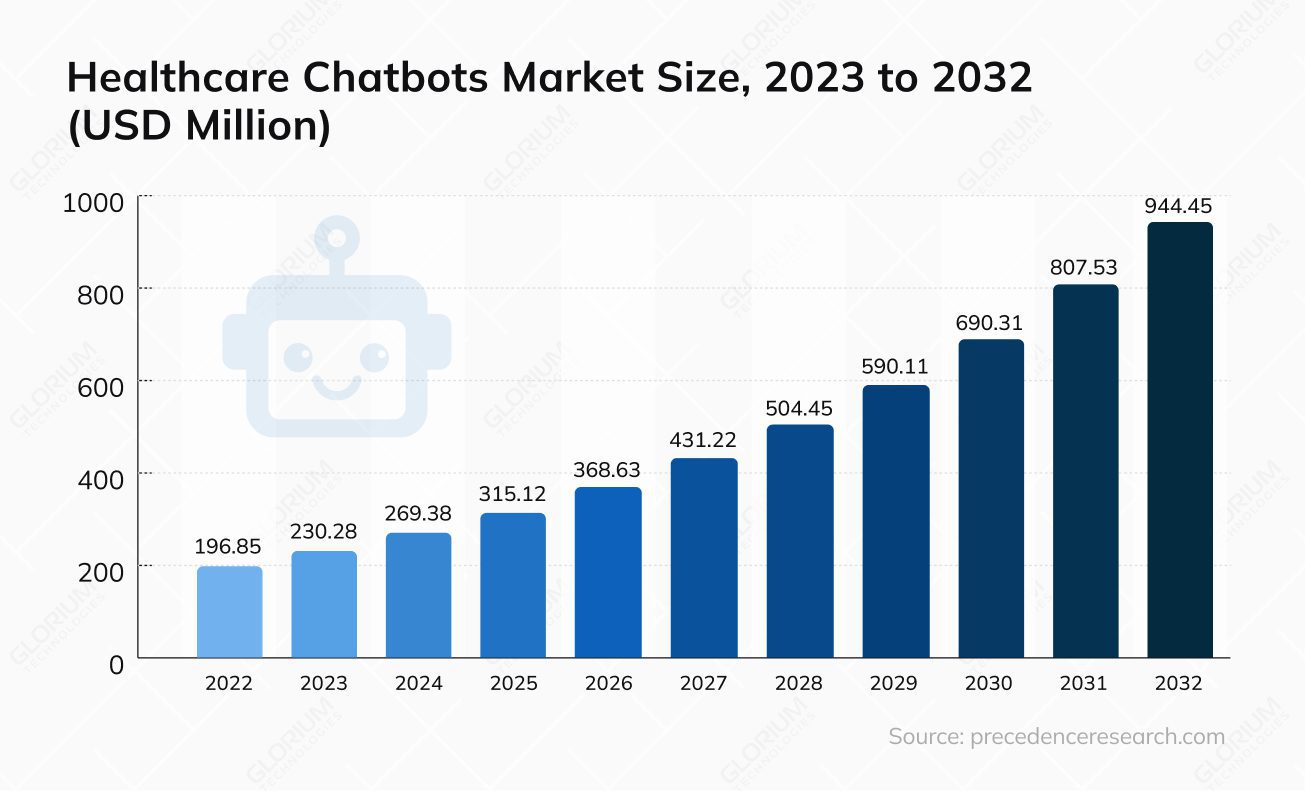
AI-powered bots and applications can monitor patient vitals, symptoms, and offer basic medical advice.
These smart technologies can monitor a range of patient vitals such as heart rate, blood pressure, and oxygen levels, and can also track symptoms over time. By using machine learning algorithms and real-time data analytics, these bots can offer basic medical advice that could be critical in early diagnosis or in managing ongoing health conditions.
For example, an AI bot can send an alert if it detects irregularities in a patient’s vitals, prompting immediate medical consultation. Moreover, these bots are often integrated with broader telehealth solutions, allowing to adjust treatment plans as needed remotely. AI bots serve as a digital bridge between healthcare providers and patients, facilitating continuous care even when face-to-face consultations are not feasible.
HealthTap is a startup that uses AI to connect users with doctors for quick consultations and provides AI-generated preliminary diagnoses based on symptoms described. AI technology helped to get amazing results. Recently, HealthTap unveiled a key alliance with Samsung to introduce virtual medical services to Samsung Smart TVs throughout the U.S. This collaboration adds a crucial new dimension to Samsung TV functionality.
With an annual growth rate of 37%, AI’s capabilities are being extensively employed across healthcare startups. AI can significantly streamline drug discovery and development, expediting pre-clinical trials and reducing costs. This is crucial for startups where resources are limited, enabling them to move products to market more swiftly. Secondly, AI-powered diagnostic automation and imaging are revolutionizing timely disease identification.
Additionally, AI contributes to predictive analytics for patient outcomes by analyzing a broad array of data including medical histories, lab results, and lifestyle factors.The integration of AI with EHR enhances healthcare delivery, automates administrative tasks, and improves interoperability between different systems. Lastly, telemedicine and remote monitoring are also benefiting from AI technology. Smart bots can track a patient’s vitals and symptoms, offering preliminary medical advice and serving as a digital bridge for continuous care, especially when in-person consultations are challenging.
Stay turned for AI technology in the healthcare industry with our upcoming webinar.

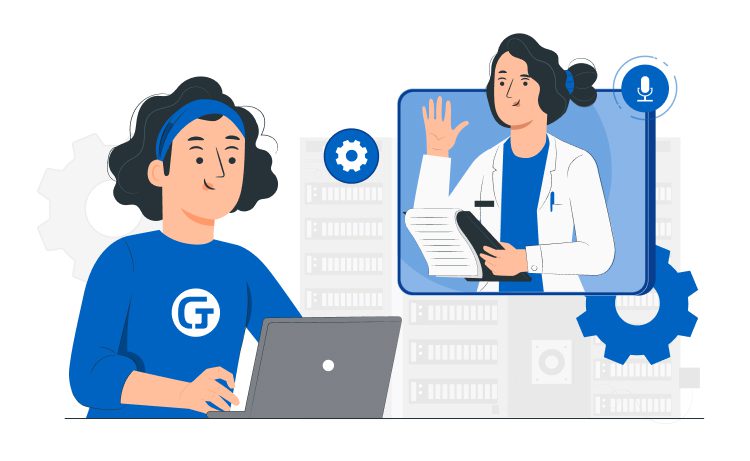
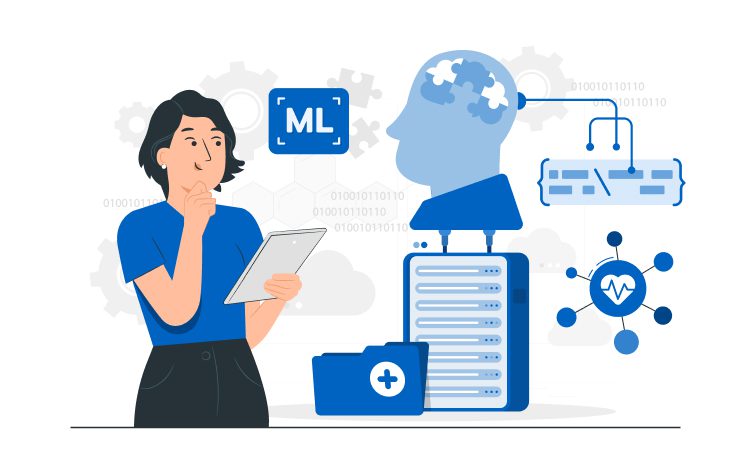
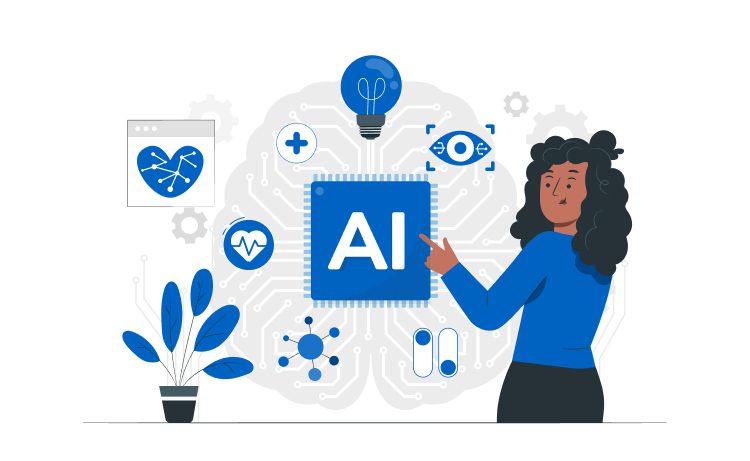
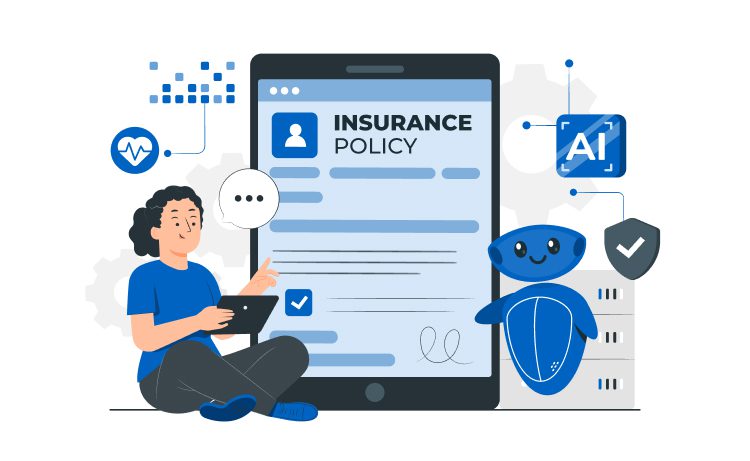
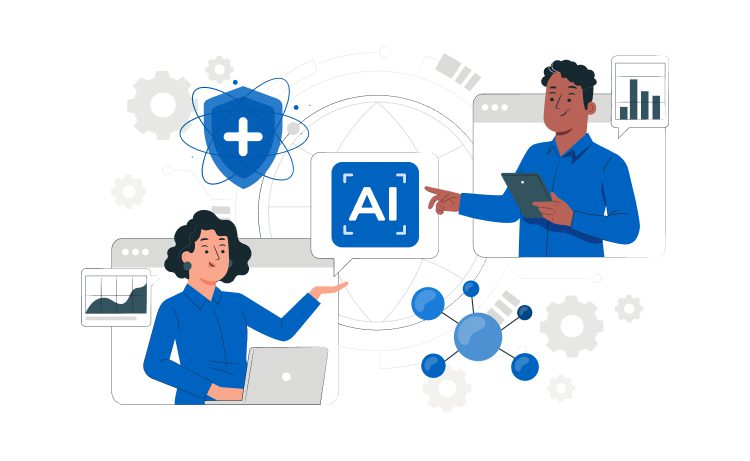
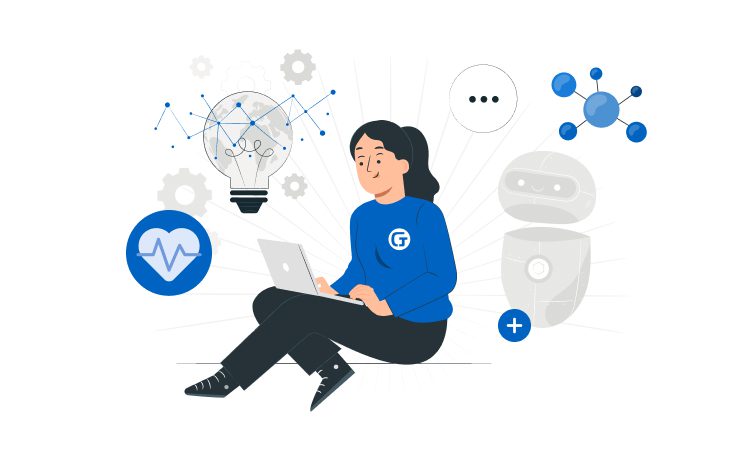

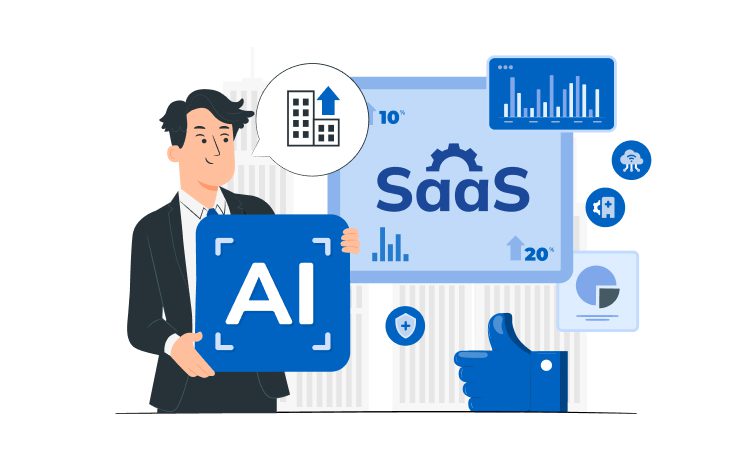
| Cookie | Duration | Description |
|---|---|---|
| cookielawinfo-checkbox-analytics | 11 months | This cookie is set by GDPR Cookie Consent plugin. The cookie is used to store the user consent for the cookies in the category "Analytics". |
| cookielawinfo-checkbox-functional | 11 months | The cookie is set by GDPR cookie consent to record the user consent for the cookies in the category "Functional". |
| cookielawinfo-checkbox-necessary | 11 months | This cookie is set by GDPR Cookie Consent plugin. The cookies is used to store the user consent for the cookies in the category "Necessary". |
| cookielawinfo-checkbox-others | 11 months | This cookie is set by GDPR Cookie Consent plugin. The cookie is used to store the user consent for the cookies in the category "Other. |
| cookielawinfo-checkbox-performance | 11 months | This cookie is set by GDPR Cookie Consent plugin. The cookie is used to store the user consent for the cookies in the category "Performance". |
| viewed_cookie_policy | 11 months | The cookie is set by the GDPR Cookie Consent plugin and is used to store whether or not user has consented to the use of cookies. It does not store any personal data. |